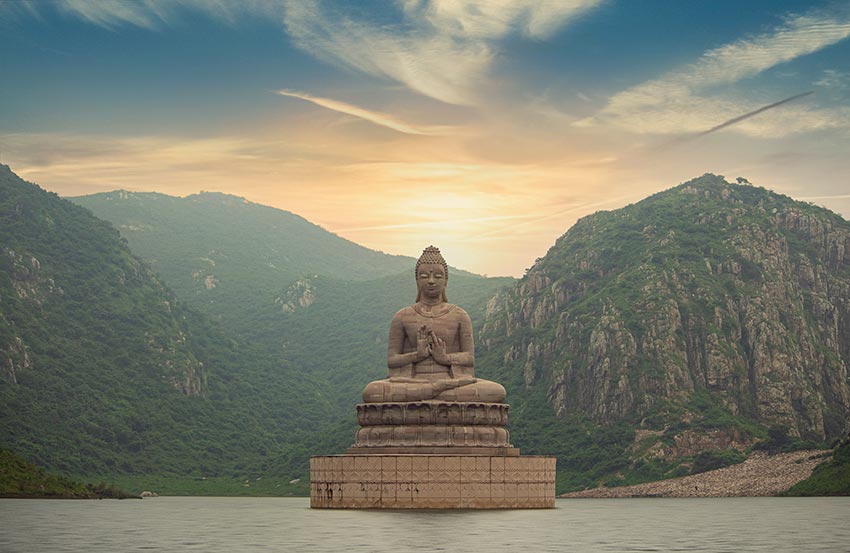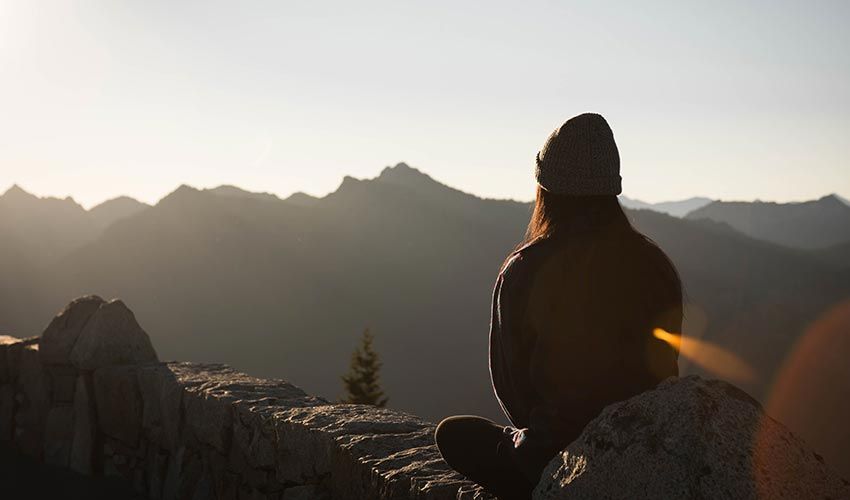Silence & Stillness: The Profound Benefits of Being Still
I don’t know about you but I definitely feel at this time a constant cacophony of information, technology, and responsibilities inundates our senses, and the idea of silence and stillness might seem like a rare luxury. However, embracing moments of quiet and stillness can have profound benefits for our mental, emotional, and physical well-being. In this article, we'll explore why silence and being still are essential in our busy lives and how they can positively impact various aspects of our existence. We will also explore the Buddhist take on what it means to be still.
Before we continue however, I’d like to express my own view on silence and stillness. There are so many benefits to being silent and still in your own company, and even getting a minute to breathe in the bathroom while you’re in the heat of parenting or working and all of those challenges still counts as a ‘moment’ of stillness. But silence and stillness hasn’t been an easy transition to embrace. I’ve also confused silence as your thoughts completely switching off during stillness or meditation so you can have clarity and peace, all the lovely things, and when this didn’t instantly occur for me I thought I was either doing it wrong or it just wasn’t for me as I would constantly be bombarded by my thoughts which in turn got much louder when I was trying to be ‘silent’. I have however realised that I was placing too much pressure on stillness, expecting myself to instantly adhere to the ideals of being silent when in reality that’s all the mind does all day long, is produce a myriad of thoughts which create feelings provoking habits; these patterns dominate our daily lives so to expect this to automatically shut down when we decide it to, especially at first, is such an unrealistic expectation and an awful amount of pressure on oneself. I saw a quote once about meditation that has stuck with me – “The goal of meditation isn’t to control your thoughts, it’s to stop letting them control you” – this really resonated with me. So when you’re considering practicing mindfulness, taking 5 minutes (or however long you have) or even starting to meditate, just remember that its not about the mind becoming quiet, it’s about becoming aware of the dialogue from a more conscious point of view. You’re choosing to consciously observe the stream of thoughts and how that then makes you feel physically (which in my case was extremely uncomfortable!). You can notice the patterns that may be keeping you stuck in a story of yourself that no longer aligns with who you wish to be (this can also take time). And from this place maybe we can start to question the more dominant thoughts or beliefs we have of ourselves and the world and unpack their relevance for where we are now and where we want to be.

So why Silence & Stillness?
Mental Clarity and Focus:
In the hustle and bustle of our daily lives, our minds are often bombarded with a never-ending stream of thoughts and distractions. Taking the time to be silent and still allows us to declutter our mental space. This, in turn, enhances our ability to concentrate, make better decisions, and solve problems more effectively. It's during moments of silence that we can gain deeper insights into our thoughts and emotions.
Reducing Stress and Anxiety:
The constant barrage of noise and activity can lead to heightened stress levels and anxiety. When we embrace silence and stillness, we create a space for relaxation and calm. It's a chance for our nervous system to reset and reduce the production of stress hormones. Regular periods of silence and stillness can lead to improved emotional well-being and a greater sense of inner peace.
Enhanced Creativity:
Creativity often flourishes in the absence of distractions. When we allow ourselves to be still and let our minds wander freely, we open the door to innovative ideas and solutions. Many renowned artists, writers, and thinkers have credited moments of solitude and silence as the birthplace of their most brilliant creations.
Improved Relationships:
Silence isn't just about being alone; it can also be practiced in the presence of others. Engaging in activities like silent walks or simply sitting together in silence can deepen the connections between individuals. It allows for more profound understanding and empathy, fostering healthier relationships. And practicing silence in amongst others company really strengthens that muscle and for me personally, then helps me when I come to being silent/still in my own company again.
Physical Health Benefits:
The benefits of silence and stillness aren't limited to the mind and emotions; they extend to our physical well-being as well. Regular meditation or mindfulness practices, which involve being still and focusing on the present moment, have been shown to lower blood pressure, improve sleep, and boost the immune system.
Increased Self-Awareness:
In the hustle of daily life, it's easy to lose touch with our inner world. Silence and stillness provide an opportunity for self-reflection. By spending time alone in silence, we can gain a deeper understanding of our values, desires, and aspirations. This self-awareness can lead to a more fulfilling and purpose-driven life.
Enhanced Problem-Solving Skills:
Many of history's great thinkers, from Albert Einstein to Isaac Newton, credited their breakthroughs to moments of quiet contemplation. When we allow our minds to rest and become still, we can access our intuition and creativity, making us more effective problem solvers.
Greater Resilience:
Regularly practicing silence and stillness can help us develop greater emotional resilience. When we become accustomed to facing our inner thoughts and feelings in silence, we become better equipped to handle life's challenges in a more composed manner.

Buddhists take on Stillness
In Buddhism, stillness holds profound significance and is often seen as a fundamental aspect of the spiritual path. The Buddhist perspective on stillness emphasizes the cultivation of inner peace, mindfulness, and insight through various practices, such as meditation and mindful living. I’ve often found myself coming back to Buddhist principles throughout the years as they’re gentle and easy to understand and put into practice. Here are some key aspects of the Buddhist take on stillness:
Meditation as a Path to Stillness:
Meditation is at the heart of Buddhist practice, and it plays a central role in attaining stillness. Through meditation, individuals learn to calm the mind, focus their attention, and ultimately achieve a state of inner tranquillity. Buddhist meditation techniques, such as Vipassana and Zen meditation, aim to quiet the mental chatter and allow one to experience the stillness within. Be gentle here though as this takes a lot of practice and consistency.
Inner Peace and Equanimity:
Buddhism teaches that suffering arises from attachment, aversion, and ignorance. Stillness is seen as a means to overcome these causes of suffering. By training the mind to be still, individuals can develop inner peace and equanimity, which help them respond to life's challenges with greater clarity and acceptance.
Mindfulness in Daily Life:
Mindfulness, or "sati" in Pali, is a central concept in Buddhism. It involves being fully present and aware in each moment, whether in meditation or daily activities. Practicing mindfulness helps individuals cultivate stillness by directing their attention to the present and disengaging from the constant mental chatter and distractions.
Insight and Wisdom:
Buddhist meditation practices not only lead to stillness but also to insights into the nature of reality and the self. Through deep introspection and sustained mindfulness, practitioners can gain profound wisdom and insight into the impermanent and interdependent nature of existence. This wisdom is believed to bring about a lasting sense of stillness and freedom from suffering.
Nature of Impermanence:
Buddhism teaches that all things are impermanent (Anicca). This particular teaching stood out for me the most when learning the way of Buddhism. Recognizing the impermanence of all phenomena is an essential aspect of Buddhist stillness. By understanding that nothing in the external world is permanent, we can let go of attachments and aversions, leading to a more profound sense of inner stillness and contentment.
Compassion and Stillness:
Buddhism emphasises compassion and loving-kindness as essential virtues. Stillness is not merely an escape from the world but a means to develop greater empathy and compassion for all beings. By attaining inner stillness, one can be more fully present for others and respond to their suffering with genuine compassion.
Silence as a Teacher:
Silence is often revered in Buddhist monastic life and meditation retreats. It is seen as a teacher in itself, providing individuals with the opportunity to confront their inner thoughts and emotions. Through silence, practitioners can deepen their understanding of their own minds and develop greater clarity.
The Buddhist take on stillness is deeply rooted in the practices of meditation, mindfulness, and wisdom. Stillness is not viewed as a passive state but as a dynamic process of self-transformation and awakening. Through the cultivation of stillness, Buddhists seek to free themselves from the causes of suffering and attain a lasting state of inner peace and enlightenment.

It’s often valued, constant activity and noise and becomes easy to overlook the incredible benefits of silence and being still. However, these moments of stillness, whatever that may be, be it meditation, contemplation, silence etc, are not a luxury but a necessity for our overall well-being. Finding time each day to embrace silence, whether through meditation, nature walks, or simply sitting still, can have a profound impact on our mental, emotional, and physical health. I would go as far as saying that getting to know our inner world is one of the reasons for being a human being. I don’t believe we are given the gift of life to just work, worry, pay bills and then retire. I think to truly ‘Know Thyself’ is the whole path. That’s not to dismiss life and all its experiences, for these are the point of living and we engage in our life as much as we can, but doing so presently, consciously and aware of our inner world surely makes for an even greater human experience. So let us make space for stillness in our lives, for it is in the silence that we often find the answers, peace, and clarity we seek.
“Be still and mindful” said the wise old tree. “Life may seem long; but time will flee.”
Angie Weiland-Crosby















